
|
 MARCH 2022 MARCH 2022
|
Coming soon - Argument Intelligence
LexisNexis® is set to launch Argument Intelligence, a new AI-powered tool.
Conscious of the intellectual labour required to construct and parse legal arguments, our objective was to provide a new set of productivity tools allowing lawyers to spend more time on substantive tasks.
Building on the power of Lexis Advance® and key resources like CaseBase® Case Citator, Argument Intelligence will jump start review of written briefs by providing a centralised tool:
- Recognising case citations and references to legislative provisions and providing an intuitive batch download option for time-sensitive research tasks;
- Displaying the text of cited paragraphs from judgments for easy evaluation of the relationship between proposition and authority;
- Integrating CaseBase’s ‘Cases referring to this case’ data for rapid assessment of the value of each cited judgment; and
- Identifying legal issues arising from a passage and mapping them to a wider landscape of legal issues derived from Australian cases available on Lexis Advance.
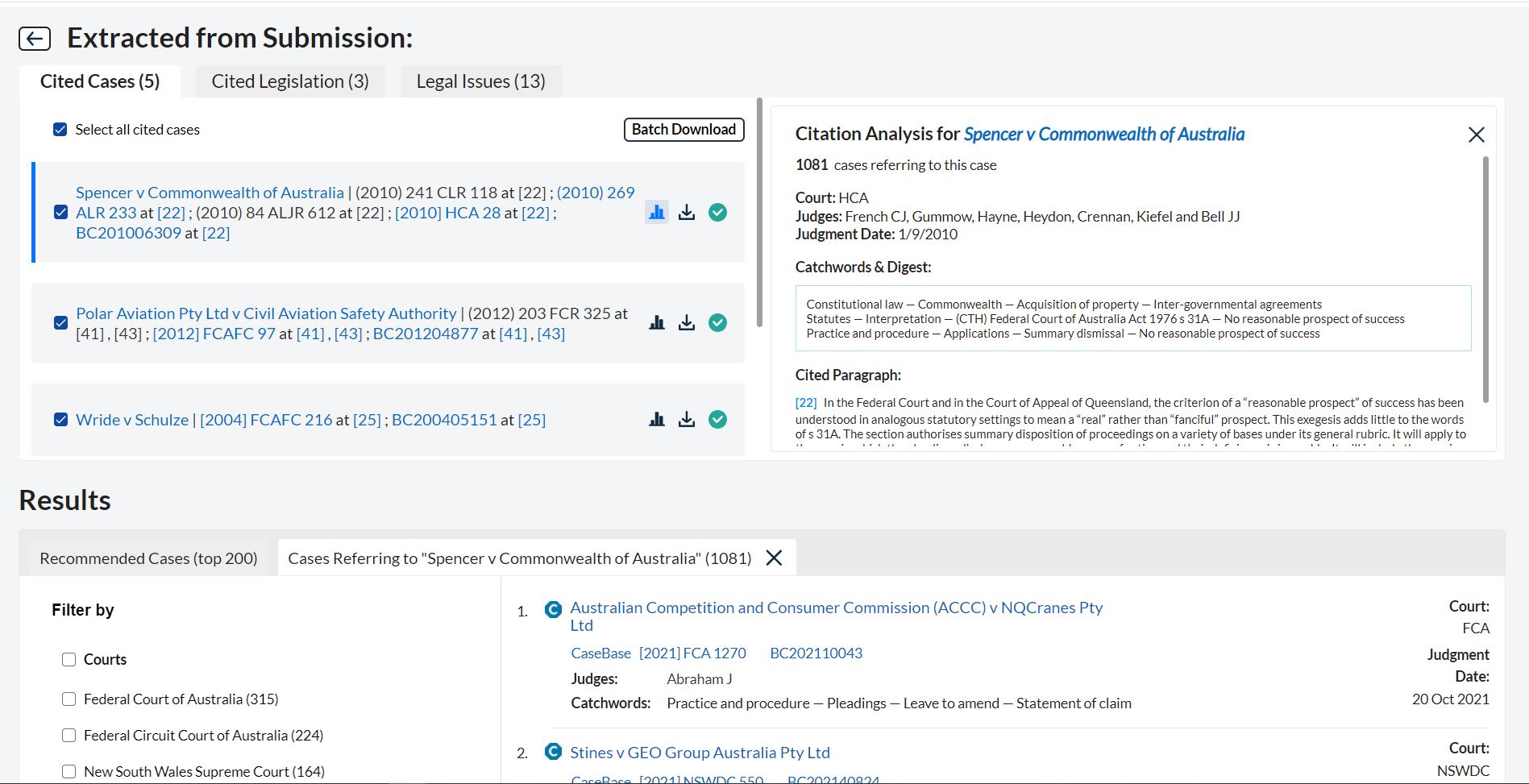
As a browser-based product, accessed on your existing Lexis Advance credentials, Argument Intelligence will be a no-fuss addition building on the power of your existing subscriptions. The interface is intuitive, drawing on familiar elements of CaseBase, for seamless integration into your existing research ecosystem.
Powerful new interactive data visualisations illustrate associations between legal issues found in Australian case law. Going beyond semantic connections to reveal relationships between topics that often appear together in Australian judgments, this feature will provide new insight into the local legal landscape.
Using the data extracted from your passage (cited cases, legislation references and legal issues) the judgments overlap with the identified themes and references, illuminating potentially unexplored angles for reviewing or constructing arguments.
Through automation, centralisation and cutting-edge technology, Argument Intelligence combines significantly improved efficiency for classic research tasks with powerful innovations designed to expose fault lines.
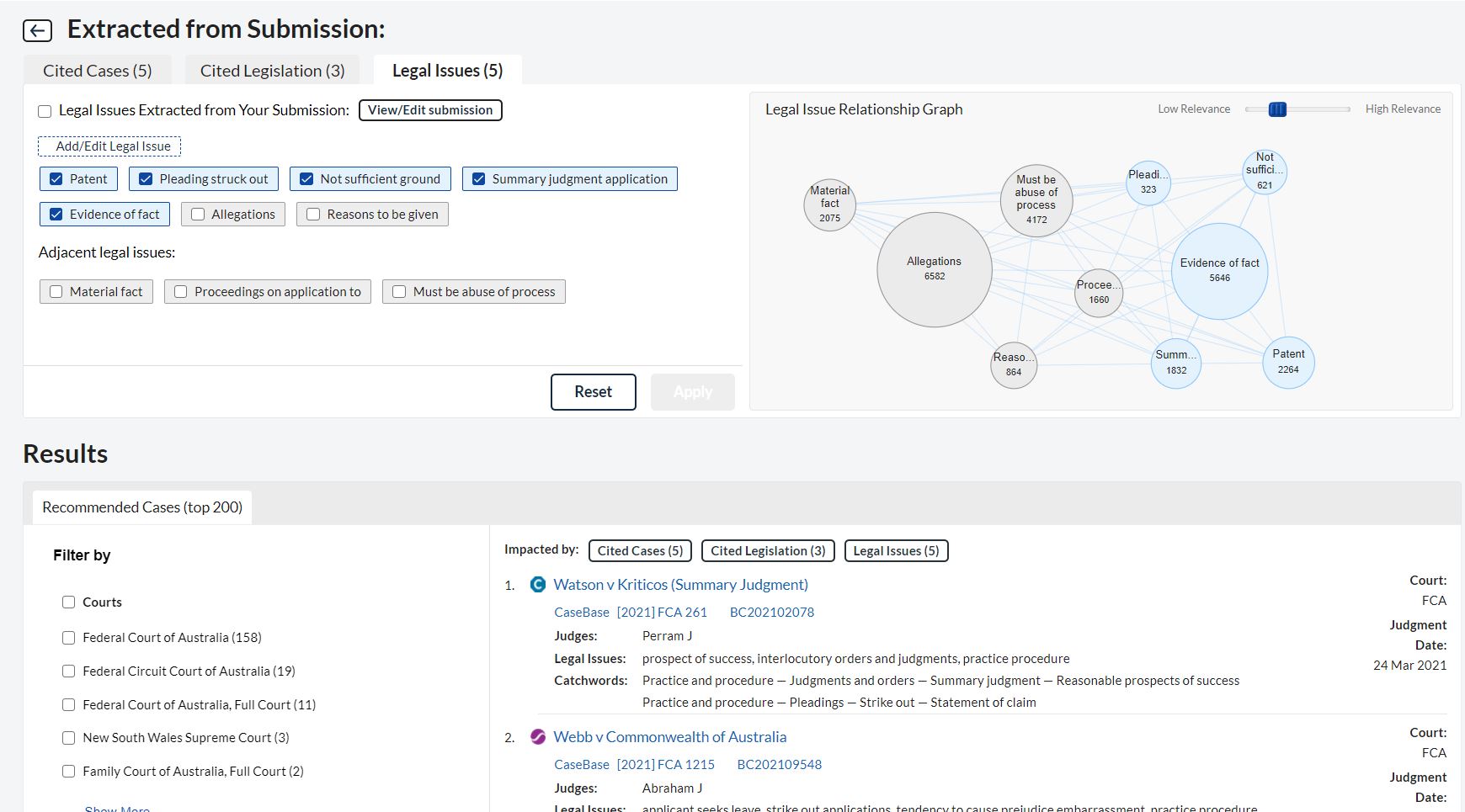
For more information or to request a trial, please contact your Relationship Manager or contact us here.
ASIC Analyser
Visualisation of legal cases and legislation to provide meaningful insights using ASIC Analyser
With a maze of regulations, tightening regulatory enforcement, greater media scrutiny and increasingly negative customer sentiment stemming from breaches, industries – in particular, financial services - need to be cognizant of meeting compliance obligations.
In such an environment, in order to achieve growth, lawyers must engage as trusted business partners to assess and articulate risk for their clients. Shaping commercial strategy to drive growth will require the provision of practical and lucid legal advice aimed at fostering new, compliant, endeavours. Clear-cut objective data and intuitive tools remain vital for avoiding existing dangers and staying within tested limits; the unprecedented power and crisp insight delivered by Legal Analytics elevates the playing field for counsel tackling the questions posed by true innovation.
Understanding past courses of action, the outcomes and overall risk will play an important role in the advice legal practitioners provide to clients.
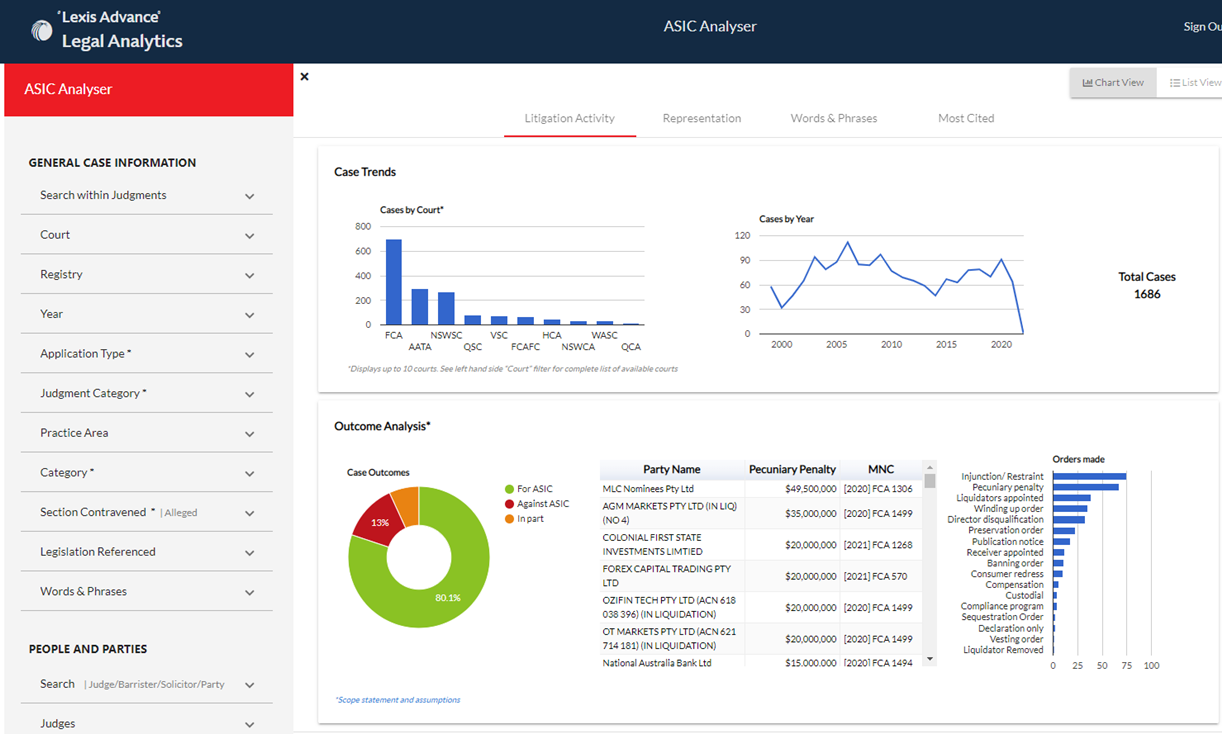
Review data by Court and assess trends; view outcomes as you adjust context specific filters to include top pecuniary penalties and detailed penalty breakdown.
ASIC Analyser mines litigation data to provide meaningful and actionable insights into enforcement trends and the range of penalties that actually materialise in ASIC cases. Using Analyser, practitioners can:
- [Better advise on] likely penalties for a matter on foot, based on the historical range of outcomes for similar conduct, parties and sections contravened;
- Minimise risk to a client’s business by keeping senior management updated on types of behaviours and sections being targeted by enforcement bodies – and providing more targeted staff education programs;
- Monitor the players and delve into the relationships between specific entities;
- Deepen understanding of the commercial environment faced by particular organisations and sectors and deliver robust advice to clients on their strategic options; and
- Extract key summaries to support litigation planning, thought leadership and business development.
For more information or to request a trial, please contact your Relationship Manager or contact us here.
Books
The first quarter of 2022 we have a number of new releases including:
- Annotated Competition and Consumer Legislation 2022 edition by Ray Steinwall. Fully revised, updated for 2022 and extracted from Competition and Consumer Act Annotated loose-leaf service. This new release provides an essential guide to key competition and consumer law legislation accompanied by authoritative annotations and relevant case law. This latest edition incorporates all recent changes in the legislation up to 1 January 2022.
- The 6th edition of Annotated Family Law Legislation by Chisholm et al is now available.Fully revised to include the new Federal Circuit and Family Court of Australia (Family Law) Rules 2021 as well as relevant extracts from the Federal Circuit and Family Court of Australia Act 2021. This new edition incorporates all recent changes in the legislation up to and including 17 November 2021.
Other titles anticipated to publish in the first quarter of 2022 include:
- Information Privacy Governance and Regulation: An E-Commerce Perspective
- Australian Tax 2022
- Principles of Remedies 8th edition
- Australian Migration Legislation Collection January 2022 edition
- Hammerschlag’s Commercial Court Handbook
- Victorian Environmental Law in Context
For more information about our upcoming titles, please contact your Relationship Manager or contact us here.
Capital Monitor™
Budgets and elections firmly on the bill in H1, but not the only focus
Rolling in so much faster this time around, the Australian Federal Budget for 2022-23 will be handed down on Tuesday, 29 March.
For many in government, Budget Day, traditionally held on the second Tuesday of May, is easily the biggest day of the year. This is when the government outlines its revenue and spending plans for the year ahead and beyond, and the implications for business are many; from business tax reform to infrastructure spending, or aged care to defence, and education.
This year we are in for an Election Budget, as it is handed down days before the federal election is called, likely in early April. The coming days will be bursting with critical parliamentary and government news & information, typically published only in the lead up to federal budget as economists scramble to forecast financial & commercial implications for the Australian market, regardless of the election outcome.
The coming days will also open a golden opportunity for last-ditch push by the Federal Government, the Opposition, Minor Parties, and the Independents, as well as the big and small ends of town to have their views accounted for in the public debate arena, before the election is officially called. This is often crunch time for Capital Monitor as the team ramps up to deliver ‘nuggets-of-gold’ insight to subscribers when true colours shine through before the election spin begins.
While Bills and Acts updates will seize when Australia’s 46th Parliament rises, and all current legislation before it lapses, the insight available during April and May via election policy announcements will be highly indicative of the direction the Government-elect (incumbent or new) will take.
Dynamic recovery conditions post-COVID-19 will also have a significant impact on the policies needed to prop up the nation. A change of government will significantly impact all areas of the economy and its activities from economic growth and the creation of new business entities, agencies, and departments through to consumer confidence, fiscal and monetary policy, regulation, as well as the delivery and funding of services and programs. This is without accounting for the policies that may be born from the rift we already know exists between the current and prospective governments in areas such as climate change, foreign policy, immigration, health and education, industrial relations, corporate tax and much more.
Other key events on the nation’s political calendar include multitude of state and territory parliaments in session across March, April and May, as well as the upcoming South Australia Election (19 March) and Tasmania State Budget (26 May).
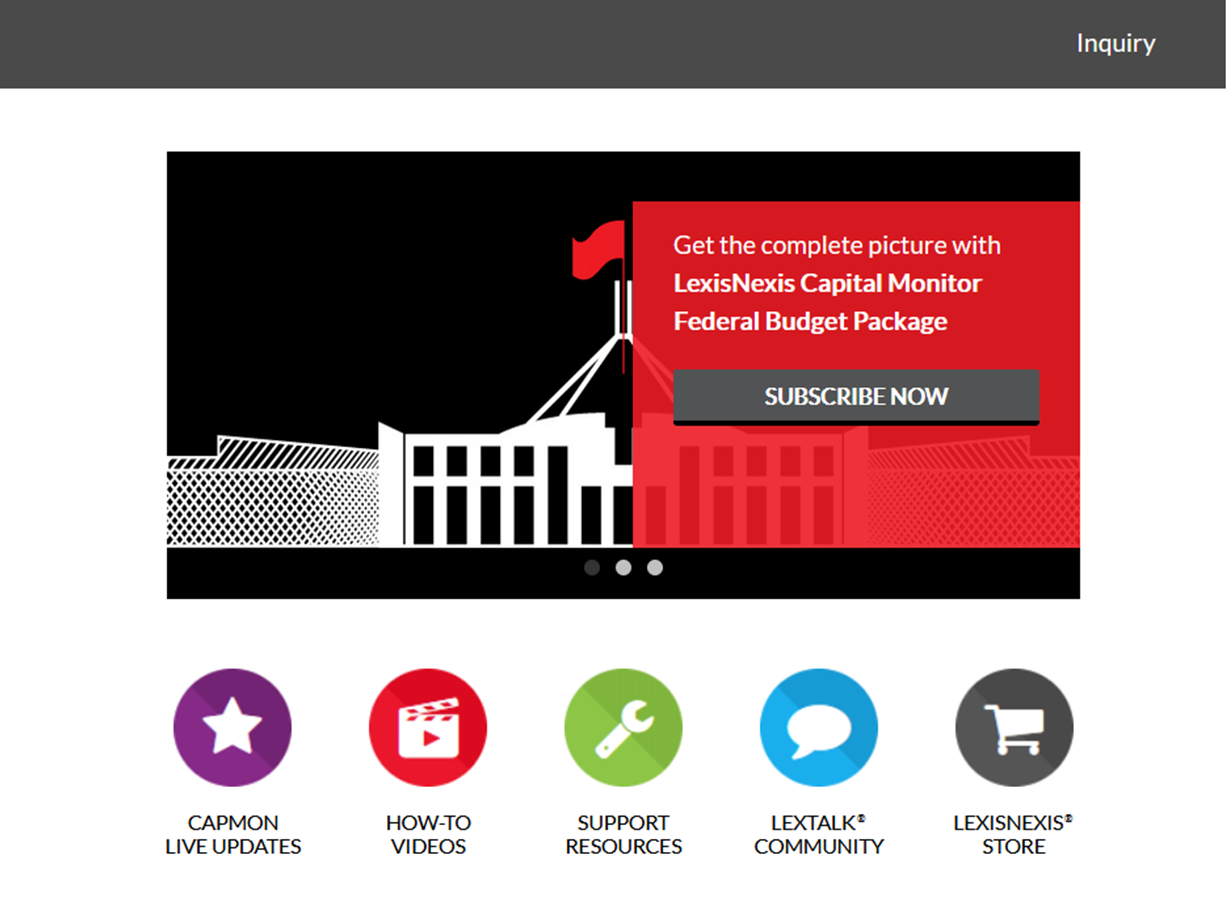
For more than 30 years, Capital Monitor has informed subscribers from all walks of life to parliamentary, political, legislative, regulatory, and judicial news and information as it happens. This year is no exception as we gear up to bring you key insights and analysis around the clock in a year brimming with political and parliamentary events slated to take place before it even hits the half mark.
In line with this and to facilitate easier content sharing across the subscription for our Corporate and Intranet Account Administrators, Capital Monitor has just revamped the secondary email addresses feature to allow administrators to import and export additional email addresses in bulk, on top of allowing them to view emails already there in alphabetical order. This streamlines the process for content sharing, particularly within larger accounts where administrators are in charge of publishing multiple and various alerts to different readers.
For more information about Capital Monitor download our lookbook or contact us here.
Coming soon - Clause Intelligence
LexisNexis is currently developing Clause Intelligence, a new AI-powered tool for lawyers who draft or review contracts. The tool will be available both as a standalone browser-based application and integrated into Lexis Create in Microsoft Word.
Clause Intelligence surfaces clauses from within LexisNexis precedent content that are relevant to clauses in the user’s own document. Instead of doing time-consuming research, drafters can simply upload their document to the browser-based app or start working on it in Lexis Create to uncover relevant alternative wording or drafting guidance.
Each relevant clause links back to the whole precedent from which it was taken, allowing users to see the clause in context.
The recommendation algorithm has been trained on real contracts to surface the most relevant clauses. Users benefit from seeing multiple options and alternatives, allowing them to tailor the clauses in their own document to better reflect their clients’ instructions and meet their legal and commercial needs. Alternatively, users can use the tool to review the wording proposed by other parties.
Initially, the product will recommend clauses from a range of commercial topics within the Australian Encyclopaedia of Forms & Precedents, with plans to expand into Practical Guidance modules. Clause Intelligence is due for commercial release in Australia in 2022.
We are currently looking for transactional lawyers who would be interested in beta testing Clause Intelligence. Please contact your Relationship Manager if you would be interested in testing Clause Intelligence or contact us here for more information.
Halsbury’s® Law of Australia
Halsbury’s Laws of Australia is constantly being updated with numerous expert authors working across various titles. Work is currently underway on titles including:
- Citizenship and Migration
- Courts and Judicial System
- Taxation and Revenue
- Aviation
- Entertainment
- Religion
- Auction
- Family Law
- Criminal Law
Professor Ron Bartsch AO is now re-writing the Aviation Title following the transition to the new Civil Aviation Safety Regulations 1998 (CASR) with the introduction of the new flight operations rules which came into effect on 2 December 2021. This Title includes (6) guidecards (Air Conventions and Administration; Regulation of Air Operations; Aerodromes and Aviation Services; Liability, Offences and Security in Aviation; Carriage by Air and Space Law). We are aiming to have this published before the end of July.
Following the merge of the Family Court and Federal Circuit Court, expert author Michelle Daniel is updating our family law content in both Halsbury’s as well as AEFP. We have just published the update to HLA Family (Guidecard II Marriage and Divorce) which the author has expanded to include procedures under the new Family Law Rules 2021 and current practice directions. Michelle Daniel is now working on Guidecard III (Children) and V (Other Relief) to be published in the near future.
We have also just published updates to Building and Construction Guidecard III (Performance) and IV (Breach and Remedies) by Dr Dominic Katter. We have also published an update to the entire Tort Title by Dr David Rolph.
We are close to finalising an update to the entire Medicine Title by Kate Waterford, having just published the updated Chapter 11 (Health Insurance).
For more information, please contact us here.
Lexis Advance Practice Area Updates
The Federal Court's decision in Djokovic v Minister for Immigration [2022] FCAFC 3 was handed down in January 2022, upholding the Minister's decision to cancel Djokovic's visa and bringing an end to the world number 1 men's tennis player's bid to stay in Australia to compete in the Australian Open Tennis Championship.
FEDERAL
Djokovic's case attracted much media attention due to the profile of the applicant and the interplay between the ongoing COVID-19 pandemic, executive powers, and federal immigration law. Beyond its notoriety, the case is significant for affirming the Minister's exercise of personal power under s 133C(3) of the Migration Act, which in this instance was used to cancel a visa initially upheld by the Federal Circuit Court. The Minister's reasons for doing so were considered by the Federal Court and drew upon the public interest, citing a risk to the health, safety or good order of the Australian public under s 116 of the Migration Act. The March issue of the Immigration Review will feature an in-depth analysis of this decision and its implications for our understanding of the function of executive powers under immigration law during a pandemic. Several other publications, including Civil Procedure Western Australia, have incorporated updates to related commentary on judicial review and exercise of the executive power.
Courts and IP offices across the globe have been faced with patent applications made by Dr. Thaler which name an AI machine called “DABUS” as inventor. A largely consistent approach has been taken to reject these patent applications and hold that only a human can be named as an inventor except for a single judge in the Australian Federal Court in Thaler v Commissioner of Patents (2021) 160 IPR 72; [2021] FCA 879. An appeal has been lodged by the Commissioner of Patents.
FEDERAL
Lead author of Patents Trade Marks & Related Rights Ann Dufty has updated Patent ownership commentary to cover the international and Australian developments in relation to the DABUS case which is making waves around the world, especially in Australia which, at the moment, is running against the tide.
Also, in an article in the Intenet Law Bulletin 24(6), The rise of the machines — intermediated creation and humanity, the authors explore how the law could deal with this vexed question of AI and intermediated creation.
New REIQ Contracts for Sale of Houses and Land and Residential Community Title were released on 20 January 2022. These are the first new versions in 4 years and a number of significant changes have been made, in particular, a new clause added to give a party faced with the inability to settle on the settlement date, for whatever reason, the ability to obtain a limited extension for settlement.
QUEENSLAND
Australian Property Law Bulletin General Editor, Sharon Christensen, has written an article for Issue 37.1 setting out the new clauses and amendments made to the old REIQ standard contracts and discusses the implications for sales and purchases of houses and land in Queensland.
The Financial Sector Reform (Hayne Royal Commission Response – Better Advice) Act 2021 came into force on 1 January 2022 and made several amendments to the Australian Securities and Investments Commission Act 2001 and the Corporations Act 2001. Its provisions implement recommendations that were made by the Banking Royal Commission; specifically, the establishment of a single disciplinary body to deal with complaints against financial advisors, and a requirement that financial advisors be individually registered so that their information can be publicly available.
FEDERAL
Of particular significance to corporations law practitioners is the establishment of a Financial Services and Credit Panel (see Part 9 of the newly amended ASIC Act and Part 7.6 Div 8B of the Corporations Act), and the new registration requirements for financial advisers (see Part 7.6 Div 8C of the Corporations Act). These amendments are discussed in Austin & Black's Annotations to the Corporations Act where Justice Ashley Black has updated his annotations to reflect these amendments. See also the companion publication, Australian Corporation Law Legislation, where the amended legislation is published.
Commentary on the recent decision of Hamilton (A Pseudonym) v R [2021] HCA 33. The case dealt with tendency evidence, namely s 97 of the Evidence Act 1995 (NSW). It was determined that there was no miscarriage of justice at trial even though the trial judge did not give the jury an anti-tendency direction.
NSW
Troy Anderson SC, author of ABC of Evidence, has provided commentary in relation to this case which explains what the "anti-tendency direction" is. A concise summary of the case has also been provided. Other recent decisions have also been provided and will be published as "Recent Developments - Update 72".
In the recent case of ZG Operations Australia Pty Ltd v Jamsek [2022] HCA 2, the High Court of Australia unanimously overturned the decision of the Full Federal Court and found that two truck drivers were engaged by a company as employees and not as independent contractors.
FEDERAL
Alan Cullen, author of Building Contracts Australia, has provided updated commentary in the Significant Legal Decisions chapter to include a summary of the High Court's decision, as well as a comment from leading Australian construction lawyer, Philip Davenport.
In Wang v R [2021] NSWCCA 282, the NSWCCA upheld the sentence of 25 years to a woman who stabbed her ex-partner to death as she lay injured on a pathway after falling from a balcony. In dismissing her appeal Hulme J (with whom other members of the court agreed) stated that it was open to the sentencing judge to reject psychiatric/expert opinion. This case is important because it confirms that judges are not required to accept all things stated by "experts" – they can reject expert opinion, particularly when there is other evidence, as there was in this case, that contradicts that expert opinion. In this case CCTV footage suggested that the offender had not had a “loss of self-control” as asserted by her psychiatrist, rather the footage established that her actions “were borne of contemplative thought”.
NSW
The first casenote in Criminal Law News - companion title to Criminal Practice and Procedure NSW - Issue 1 of 2022 discusses this case. The authors - Justice Hulme of the NSWSC and Peter Berman (former judge of the NSWDC) update practitioners in NSW with the latest appeal court cases relevant to criminal law.
On 24 November 2021 the Federal Treasury released its ‘Independent Review’ of the Australian Financial Complaints Authority (AFCA) to the wider public. AFCA was established in November 2018, its foundation signifying a substantial overhaul of the Australian financial services dispute resolution framework. The Review praised the Authority for its performance in a “difficult operating environment and changing regulatory landscape” and made 14 recommendations in total.
FEDERAL
The article, ‘The Independent Review of AFCA’ is penned by editorial panel member Andrea Beatty, and fellow Piper Alderman colleagues Chelsea Payne, Alessandra Romeo and Tom Murdoch. It will feature as the first article in the upcoming issue of the Financial Services Newsletter. The article highlights the key recommendations made by the Review. It explores and appraises the extent to which AFCA’s ‘growing pains’ have been effectively addressed by the recommendations. The article further details the need for AFCA to ascertain greater transparency, efficiency and timeliness. In addition, the article also explains the need for AFCA to further diversify and improve several of its functions to firmly consolidate its authority in the Australian financial services landscape.
The Market Notice of 24 January 2022 entitled ASX Market and CS Facilities - Package of Miscellaneous Procedure Amendments specifically contributes to the five-year rolling rulebook review process that the ASX impliements to identify rules and procedures that need to be updated or aligned between rulebooks
FEDERAL
Items updated include:
- update references to the ASIC Market Rules;
- replace good fame and character with fit and proper person and align with ASIC’s Regulatory Guides;
- recognise the admission of a participant to another ASX market or CS facility for business integrity purposes;
- update methods of notification to reflect current practice via ASX Online;
- align BCP testing requirements across the rules of the ASX CS facilities for consistency.
Set against Australia’s response to climate change in Glasgow, and the two-year-old National Hydrogen Strategy (NHS), there are major energy regulation issues in the coming year. While the NHS is key to developing Australia’s green hydrogen potential to reduce greenhouse gas emissions and to provide export dollars, the issues this year are about the business engagement in government hydrogen schemes and grants. In 2022-23 the federal Department of Industry, Science, Energy and Resources is establishing a hydrogen certification and guarantee of origin scheme in Australia. This certification will state whether that hydrogen was produced in a certifiably clean manner (ie funded with green bonds, using renewables to separate hydrogen from water).
FEDERAL and STATE
A special issue of the Australian Environment Review will contain four articles addressing these key issues, some explaining the science of hydrogen power; Australia’s world-class supply potential (esp with world oil and gas shortages); the legal and regulatory challenges in regulating these issues in a federation; and the green finance and certification issues. One of the articles also addresses the extent to which Aboriginal Australians will have access to share in projects and benefits, and that many projects will require tracts of land subject to native title.
Lexis® Create
Legal drafting made simple
Creating legal documents is a time-consuming task every lawyer must tackle – even when using precedents. Lexis Create is the one tool you need to effectively save time, deliver consistency and minimise errors while seamlessly linking with LexisNexis legal intelligence products, all within the Microsoft Environment.
Seamless integration is the Lexis Create difference.
Instant access to case law, including the status of the case — no matter what you are working on, Lexis Create will help you build, check and complete your documents.
Save time. Reduce risk.
Lexis Create is embedded within the Microsoft environment you use every day, to help you create, share and review legal documents. Linking seamlessly into your other LexisNexis legal intelligence products, Lexis Create ensures accurate and efficient drafting so you can focus on putting your legal knowledge into practice.
For more information, download our Lexis Create lookbook or contact us here.
Lexis Red®
In March we will be making available a new release for Lexis Red – version 3.1.7. The enhancements focus on making the Lexis Red app easier for you to use.
Manage your titles
- Return your loan titles with just two clicks from directly within the Lexis Red app.
Find the titles you want more quickly
- New publication cover designs enable you to quickly locate the title you are looking for.
Preserve your content for future use
- Retain access to any important annotations and highlights you have made within a loan title for the next time you borrow that title
For more information on Lexis Red, please contact us here.
MLex
What you may have missed in 2021
- Topic tags were added, providing a more granular indication of what each story is about and allowing subscribers to navigate to more content on the same topic. Subscribers can now filter search results by topic and set up a related Saved Search alert.
- ‘Future Mobility’ was launched, providing expanded coverage of technology and energy regulation as relevant to transport and connected industries. MLex boasts comprehensive, forensically detailed coverage of the two major trends which are shaking up transport and related industries: digital transformation and the energy revolution. With MLex’s real-time Future Mobility reporting and forward-looking analysis, audience can keep track of all significant developments with the potential to impact their business and clients across the globe.
- In Australia, our reporters dash from one court hearing to the next, reporting on what we now recognize as historic developments in Australian regulation. Whether it was the Australian Competition & Consumer Commission’s Digital Platforms Inquiry, or federal prosecutors testing the waters with criminal-cartel prosecutions, or data-portability initiatives being rolled out, much of what we were covering was uncharted an unreported in mainstream media.
- Made it easier to download and share content, with new buttons on MLex 2.0: Copy link; Copy text; Download to PDF and Print-Friendly format.
- Rolled out new ‘responsive’ template for the Daily Wrap-up alerts on customized content sets, making it easier for subscribers to scan the content and making the email easier to read on a mobile device.
- Enabled alerts for specific countries on customized content sets, rather than only by a broader world region.
For more information download our MLex lookbook or contact us here.
Nexis Newsdesk
A media intelligence solution, Nexis Newsdesk allows the search, analysis and sharing of critical information necessary to make data-driven decisions. Helping organisations stay on top of industry trends, inform, and maximize brand awareness conversations, and monitor their online reputation, Newsdesk is powered by 40,000+ data sources aggregating and filtering international and local news, web articles, social media data and more.
In Australia, Newsdesk is used to search an unmatched, global content collection from a single dashboard, helping entities improve their ability to monitor the buzz around companies and brands, and give them the tools to conduct advanced competitor analysis.
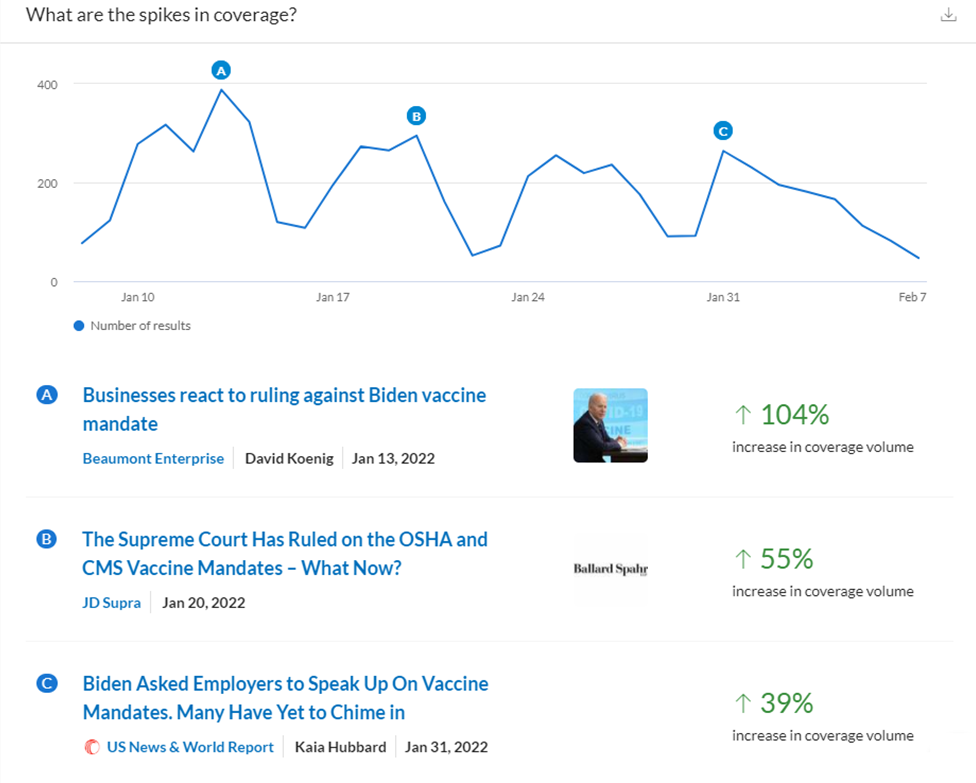
Recent updates, too many to list here, include the following enhancements from February:
- Understand Spikes and Their Related Stories Better
- Now, when viewing the Spikes in Coverage chart at the Insights tab, you can view the news stories that are driving the coverage spikes without clicking. This makes it easier to see “the big picture” when saving the chart as a PDF or PNG file.
- Improvements to Insights: Top Stories
- We’ve changed the way we’re displaying Top Stories on the Insights tab. Now, each story appears on its own “card”, and these story cards are displayed horizontally. Additionally, when viewing Top Stories and clicking the Similar articles link, we’ll show you all available stories, rather than just limiting the list to the top 4.
- Delete RSS Feeds
- You (as well as admins) can now delete RSS feeds you’ve created that you no longer need or find useful.
Nexis Newsdesk™ won the CODiE award for Best Content Search & Discovery Solution 2020.
For more information on Nexis Newsdesk contact us here.
Practical Guidance
Practice area highlights
WHAT'S NEW?
Sustainable Finance topic in PG Banking & Finance
New guidance for practitioners, lenders and corporate borrowers on the rapidly developing area of sustainable finance, covering the relevant Australian regulatory framework and principles, green finance and sustainability-linked finance.

Webinar – Sustainable Finance
Our panel of industry experts, James Darcy and Nicholas Adkins, Partners at Allens, Camille Wynter, Director of Sustainable Finance at Commonwealth Bank of Australia and LexisNexis Practical Guidance Banking & Finance Senior Legal Writer, Michelle Sim to discussed:
- Recent developments in sustainability-linked and green lending transactions in Australia
- Outlook for the Australian sustainable finance market in 2022
- Insights from recent transactions
- Practical resources available to you when navigating this space
To listen to this session, please click here.
New content in PG Business – guidance on variation of contract, and new precedents
New guidance about drafting effective variations of contract (including agreements and deeds), together with drafting tips and discussion of relevant laws which may impact variations. Accompanied by a new precedent Variation deed which practitioners can use to vary general business and commercial contracts.
New precedent unit trust deed including detailed drafting notes to help practitioners understand key considerations when establishing a unit trust and optional clauses to help practitioners tailor the deed to their client’s needs.
Competition law topics – Access Services, Competition Law Compliance, Competition Law Litigation, and Current Issues in Competition Law
We have broadened the scope of Practical Guidance Competition to cover access services and sector-specific rules, competition law litigation and increased depth of guidance on competition law compliance, as well as current issues in competition law.
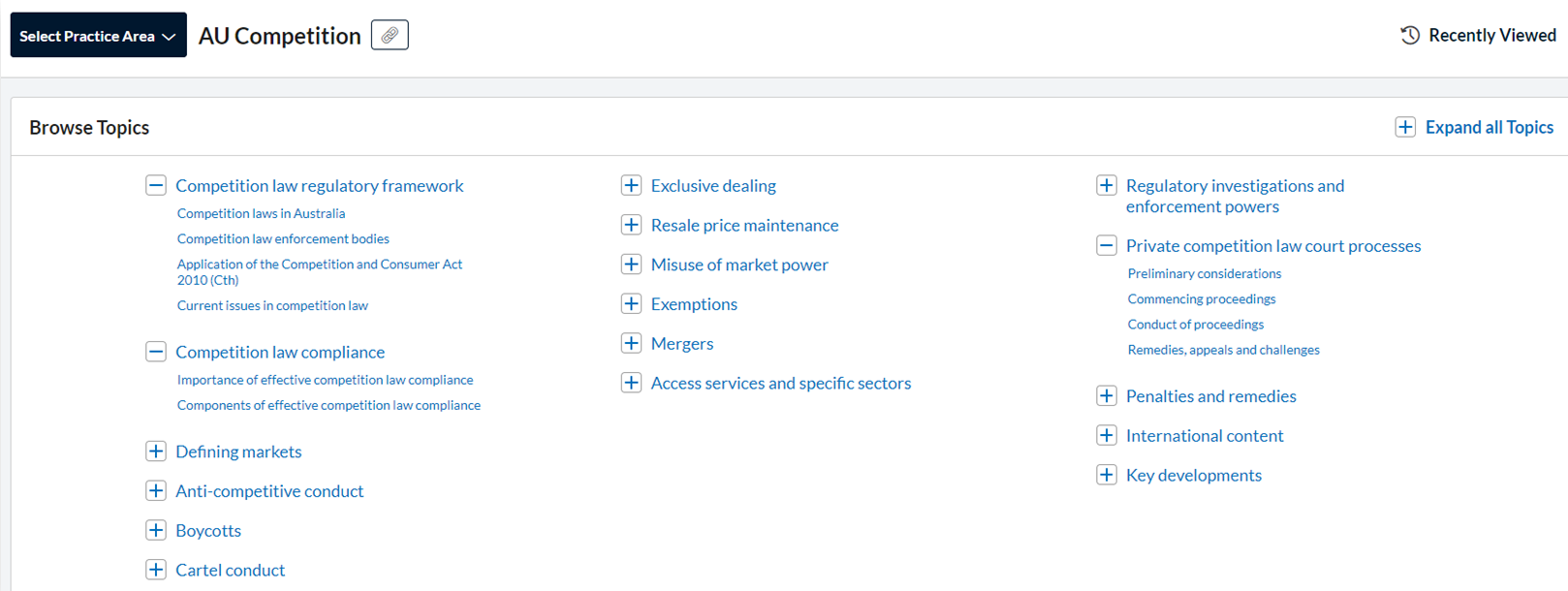
New content in PG Corporations – ESG for corporate lawyers
A new sub-topic covering the fundamentals of ESG, why companies are interested in it, and what corporate lawyers need to know, including what is involved in “ESG due diligence”, so that they can advise clients on a subject that is growing in importance in the corporate space.
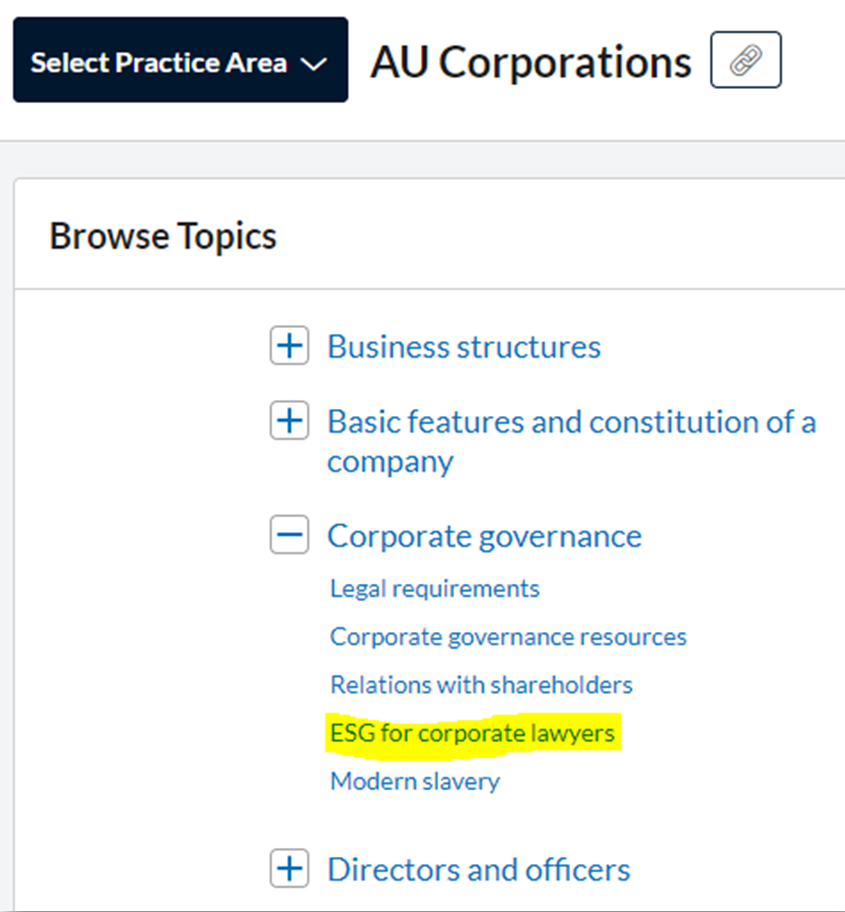
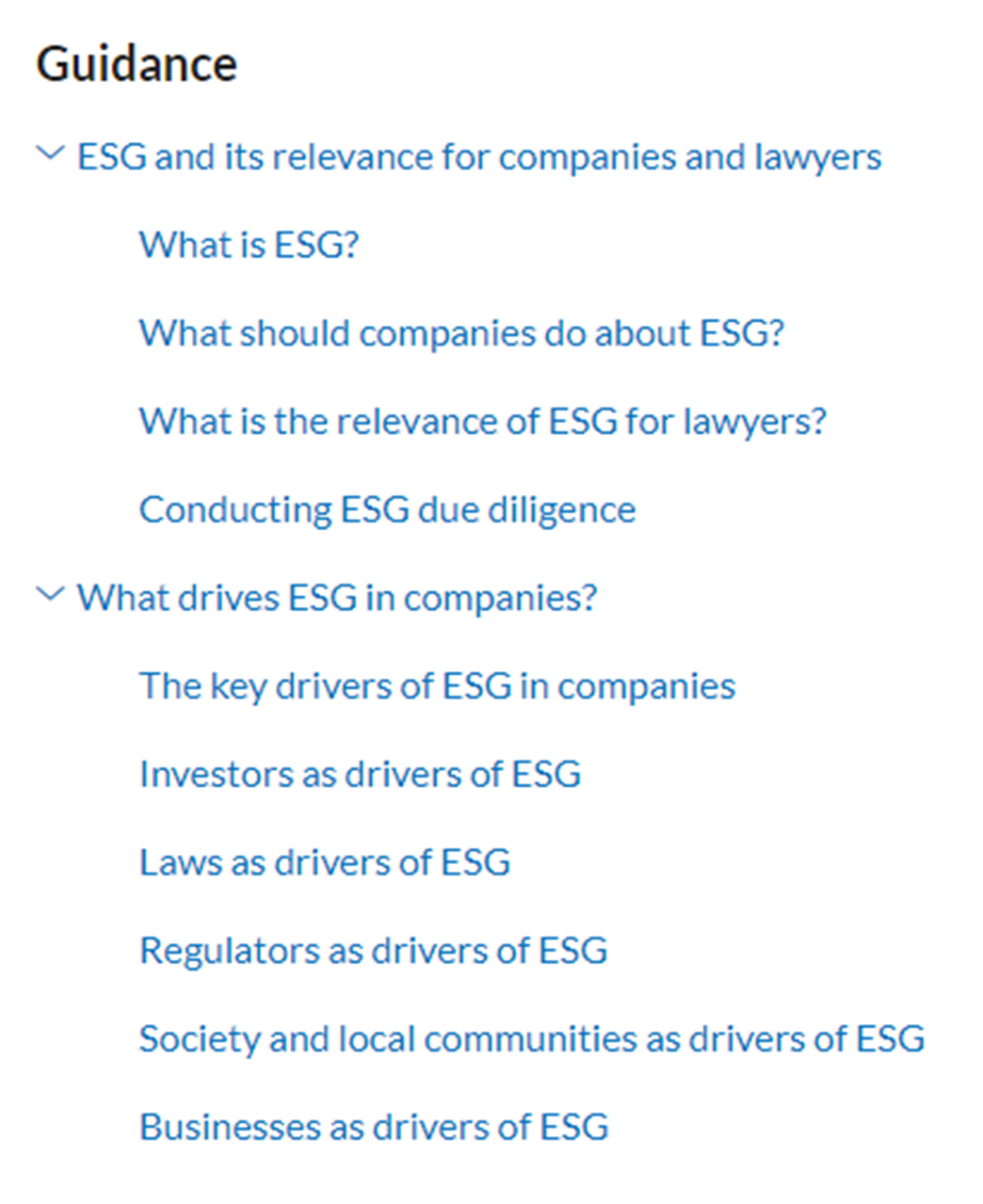
Signing Tool in PG Property
New signing tool customised for property law practitioners. This is an easy-to-use tool that helps property lawyers produce the correct signing blocks for their agreements or and includes practical “tool tips” on signing formalities for documents.
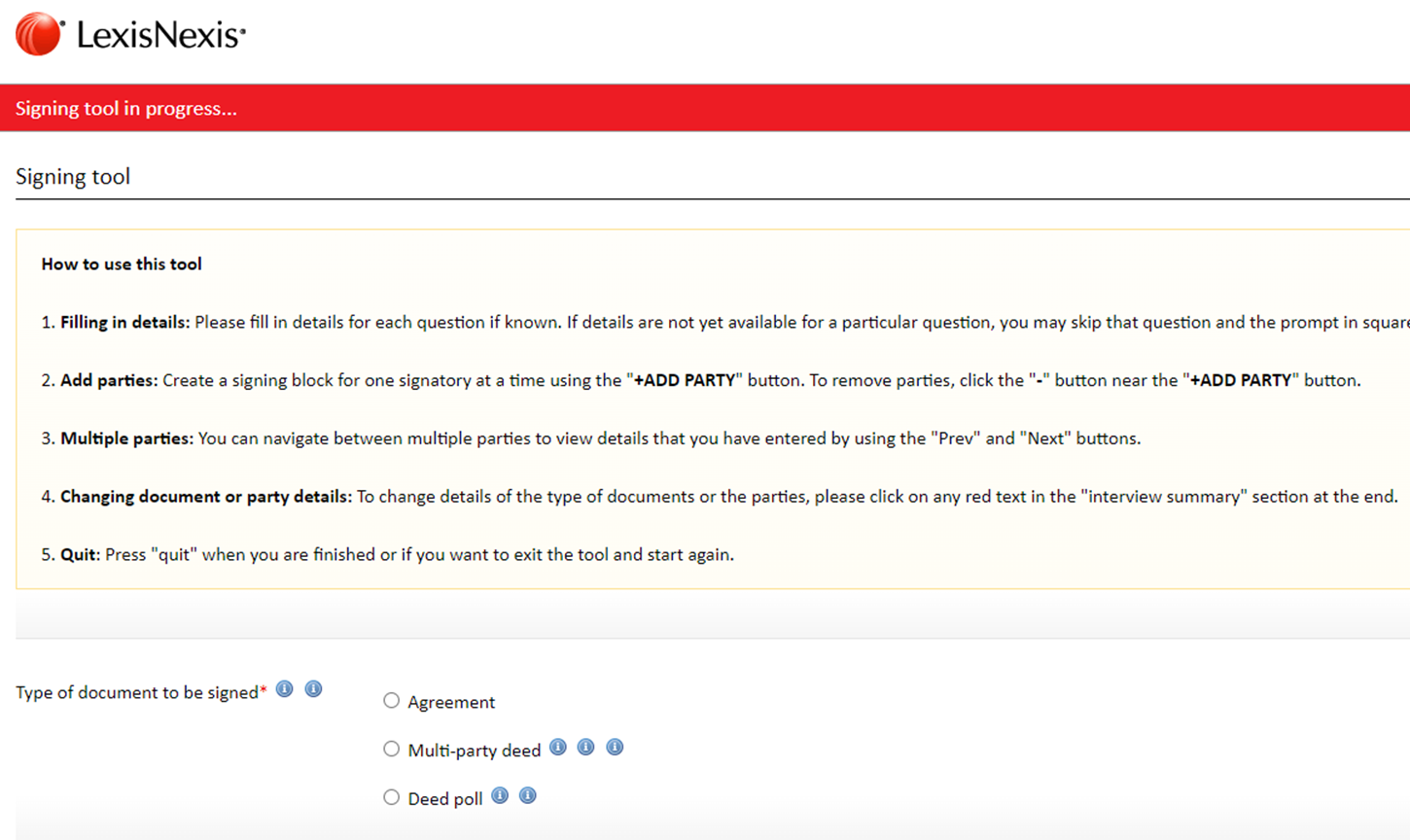
Tax-related obligations topic in PG Governance
New topic that provides guidance to assist board members and executive management comply with their company’s tax related obligations. The topic also provides guidance on tax considerations when setting up a company.
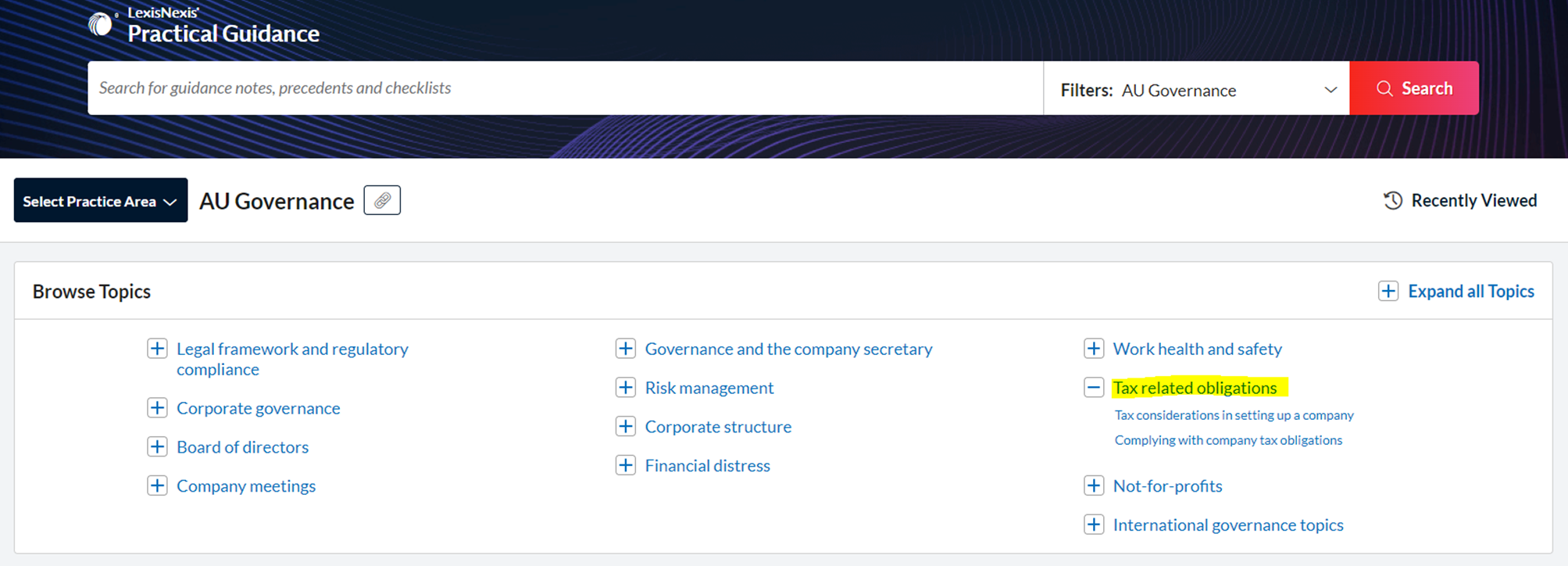
WHAT'S COMING UP?
Coming soon in PG Corporations – E-signing and virtual meetings reforms; and new guidance on Corporate collective investment vehicles (CCIV)
Revised guidance and checklists on meetings by companies and boards and to the Signing Tool to help lawyers navigate new permanent reforms to Corporations Act provisions on virtual meetings and electronic signing by companies starting on 1 April 2022.
New guidance on corporate collective investment vehicles (CCIV) to walk corporate lawyers through a long-awaited major change to the Corporations Act starting on 1 July 2022.
Coming soon in Practical Guidance Employment
Revised guidance on characterising employee/contractor status. New guidance note, precedents and checklist on managing misconduct and investigations.
Coming soon in Cybersecurity, Data Protection and Privacy
New topic on Chinese Personal Information Privacy Law (PIPL) to assist organisations that do business in China or have employees in China understand the newly minted information privacy obligations that could apply to organisations, with the assistance of a PIPL applicability questionnaire toolkit and detailed guidance notes that set out core concepts and their possible applications.
White label training materials for both lawyers and non-lawyers to provide sound training on core privacy principles and the mandatory notification regime to ensure that all employees in an organisation are aware of their data security obligations.
Coming soon in Practical Guidance Dispute Resolution – New Supreme Court coverage for WA and SA
Conduct litigation with confidence in the Supreme Court of Western Australia and the Supreme Court of South Australia with two, new comprehensive topics containing detailed guidance notes, checklists and precedents that provide step-by-step practical guides to court procedures in those jurisdictions and pull together the relevant legislation, court rules, practice directions, cases and links to commentary.
Coming soon in Practical Guidance Intellectual Property – new topic on Indigenous Culture and IP
New topic covering Indigenous Culture and IP, designed to help lawyers understand ICIP, the interaction and gaps between ICIP and the main forms of IP protected in Australia, and how to work respectfully with our First Nations Peoples.
Coming soon in Practical Guidance Personal Injury (Queensland) - new topics
New topics in relation to coronial inquests, dust diseases and civil aviation claims.
Coming soon in Practical Guidance Personal Injury (Victoria) – New table covering Damages Awards in Victoria
We will be making our table of “Damages Awards Victoria — Significant Cases” more comprehensive, covering both economic loss and general damages along with any other heads of damages awarded. This will form part of a broader reform with the Personal Injury modules for New South Wales and Queensland.
Practice area highlights
- PG Banking & Finance – Updated guidance tracking the status of reform regarding companies signing under section 127 of the Corporations Act and the various measures implemented at a state/territory level allowing electronic signing and remote witnessing of documents. New guidance on unitranche financing and accordion facilities to assist practitioners when advising on these unique features of acquisition finance transactions. New checklists for conducting property acquisition financing transactions electronically on PEXA for both NSW and Victoria. New checklists for dealing with consent requests, waiver requests and facility amendments (and related precedents).
- PG Business – Enhanced Trusts guidance (including using trusts for business, tax and stamp duty considerations, and special trusts such as charitable trusts) accompanied by updated trusts checklists. Enhanced guidance providing an introduction to Australia’s foreign investment regime, updated for significant legislative changes in 2021. Enhanced Personal property securities checklists, including checklists for registering security interests on the Personal Property Securities Register (PPSR), searching the PPSR, and drafting and reviewing security agreements. Updated Corporations law checklist for registering a proprietary limited company. Updated Business disputes topic to reflect recent changes to court rules. Updated Insolvency checklists for key insolvency areas (key considerations before appointing a receiver, key steps in the winding up of a company). New Purchase and sale of business checklist for completion of asset sale.
- PG Competition – Take a look at our ACCC mergers case tracker. User-friendly, it summarises every public informal merger review completed by the ACCC by (1) parties; (2) industry/sector; (3) competition issues/market definition; and (4) the decision. Visit the Knowledge Network for a demonstration video.
- PG Consumer – Enhanced guidance on product safety. Enhanced guidance on the consumer guarantees and unconscionable conduct.
- PG Corporations – Enhanced guidance on insider trading, takeovers, related party transactions, financial reporting and share capital reduction. Enhanced guidance on directors and officers to cover new Director Identification Number requirements. New checklists on key practical considerations relating to signing by foreign companies, key financial reporting requirements for small proprietary companies, and key practical considerations when using virtual meeting technology. Updated buyer’s/seller’s drafting guide for share purchase agreements, and precedents for share capital reduction and buy-backs.
- PG Cybersecurity, Data Protection & Privacy – New guidance notes on cyberthreats and cyberattacks – specifically on ransomware and cybersecurity while remote working. These guidance notes will assist organisations build up their cybersecurity resilience prior to any ransomware attack, ensure their cybersecurity strategies in place are adequate with a number of employees are working remotely and have a plan in place in the case of a cyberattack (including the consideration of whether to pay a ransom for the release of sensitive, commercial information).
- PG Dispute Resolution – New subtopics for the Supreme Court of Western Australia and the Supreme Court of South Australia canvassing preliminary considerations, preparation of originating processes, service and service of documents. New checklists for determining the admissibility of opinion evidence (all jurisdictions). New checklists for objecting to expert evidence (all jurisdictions). New checklist for common types of injunctions (all jurisdictions). New precedent letters advising clients about limitation periods (all jurisdictions). New precedent application and affidavit in support of transferring proceedings between Federal Court registries. Updated guidance to reflect new legislation conferring limited Federal jurisdiction on the Magistrates’ Court of Victoria.
- PG Employment – New guidance on sexual harassment in the workplace and revised sub-topic – stopping workplace bullying and sexual harassment. New tools to navigate multi-jurisdictional discrimination and harassment laws – Comparative table for process under discrimination and harassment legislation in Commonwealth State and Territory jurisdictions and Comparative table of exceptions, exemptions and special measures for unlawful discrimination in federal, state and territory jurisdictions.
- PG General Counsel – New notes on environmental claims, obligations around unsubscribe facility and modern-day pyramid schemes. Updated materials reflecting recent court decisions regarding final pecuniary penalties, what is not a future matter and when silence is not misleading.
- PG Governance – New topic Tax related obligations. Updated materials across the module reflecting changes on continuous disclosure rules, use of technology for meetings, industrial manslaughter regime, ASIC whistleblower guidance and new AASB and ACNC financial reporting requirements.
- PG Insolvency & Restructuring – New bankruptcy topic covering bankruptcy notices and creditor’s petitions together with related checklists, the effects of bankruptcy, personal insolvency agreements and the role of the trustee in bankruptcy. New guidance for parties to contracts seeking to enforce contractual rights against companies in the various types of external administration. Unfair preference claim guidance updated for important case on set-off. Expanded guidance on public examinations by liquidators to assist with preparing the necessary court application as well as tips for the conduct of an examination.
- PG Intellectual Property – Expansion of guidance on moral rights and performers rights, new trade mark registration and opposition checklists, new subtopic covering dispute procedures. New topic covering Indigenous Culture and IP, designed to help lawyers understand ICIP, the interaction and gaps between ICIP and the main forms of IP protected in Australia, and how to work respectfully with our First Nations Peoples.
- PG Mergers & Acquisitions – Updated guidance on Australia’s foreign investment regime to reflect critical infrastructure reforms in December 2021. New checklist assisting practitioners (particularly juniors) to complete private M&A share transfer forms. Updated and streamlined private M&A completion checklists to improve usability. In the pipeline: updated guidance on public M&A takeovers transactions, new checklist with step-by-step guidance on applying for foreign investment approval, and new consolidated guidance on exemptions to the foreign investment regime.
- PG Personal Injury NSW – Our guidance in Total and Permanent Disability claims has been reviewed. Our civil aviation claims guidance will be updated imminently. There are new precedents now available in these topics as well as new Statement of Claim precedents for various public liability claim types.
- PG Personal Injury Vic – Coverage of civil claims for institutional abuse and aviation injuries has been thoroughly updated.
- PG Property – New guidance for rural transactions and crown land in Victoria, and new and updated guidance and precedents for leasing, including retail. New signing tool customised for property law practitioners. This is an easy-to-use tool that helps property lawyers produce the correct signing blocks for their agreements or and includes practical “tool tips” on signing formalities for documents. Updated toolkits in the COVID-19 property toolkit and the Electronic signing and remote witnessing of property documents during the COVID-19 pandemic toolkit.
- PG WHS – New guidance on the interaction between the Fair Work Act and State/Territory WHS notice of entry provisions.
For more information, download our latest PG lookbook or contact us here.
Practitioner Books Online
De-mystifying Practitioner Books Online – also known as ‘PBOs’
LexisNexis Practitioner Books Online take the comprehensive and expert commentary contained within a hard copy text designed for practitioner use and integrate it with Lexis Advance. Practitioner Books Online enable readers to start research via expert explanation and then click through to legislation, caselaw and secondary materials referenced in the text.
For both novice researchers and those more experienced in a subject matter, Practitioner Books Online offers a highly effective launching point for comprehensive research of a matter or issue.
Accessing Practitioner Books Online on Lexis Advance
Practitioner Books Online can be accessed on Lexis Advance via the ‘browse’ feature or the search bar.
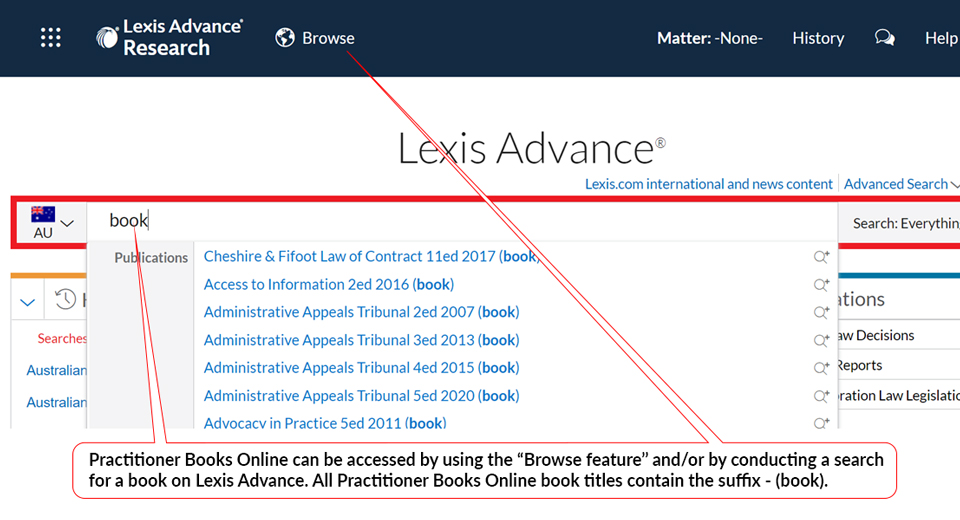
Users could also access Practitioner Books Online by navigating to the “View Publications” pod and selecting the appropriate filters i.e., secondary materials → Textbooks
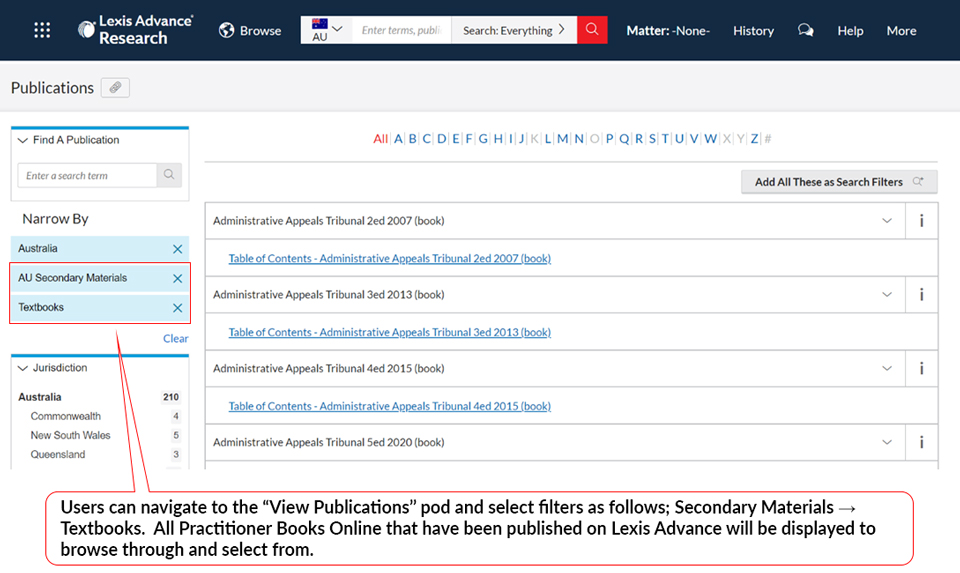
How can Practitioner Books Online help legal professionals?
Like all other formats (hard copy, eBooks and Red books), Practitioner Books Online provide low-cost access to authoritative content and complement the broader content sets on Lexis Advance.
- Can be accessed through a central point of access on Lexis Advance
- Can be accessed via other LexisNexis products such as LawNow Plus Legislation Citator
- Concurrent access for as many Lexis Advance users as set up
- Complements research by being available alongside other LexisNexis material on the platform
- Contain links to relevant legal content such as Cases and Legislation
- Having Practitioner Book Online on Lexis Advance means you can use the sophisticated AI-driven search provided by Lexis Advance including intuitive features like the search term map
- The front cover and prelim pages are available so users can download those along with relevant passages to hand up in court (or to stakeholders) to establish the edition, author, and currency
- Page breaks are captured so users can compare with the print version if they need to.
For more details regarding the Practitioner Books Online publishing schedule and subscriptions please contact your Relationship Manager or contact us here.
Rule of Law
In late January, we published the latest edition of our bi-annual Rule of Law digest, Advancing Together, featuring some of the disruptors in our time who shared how they change things up through their start-ups, projects and initiatives.
As we turn a corner with 2021 well in the rear-view mirror, these are some of the projects we worked on in recent months.
First and foremost, LexisNexis was one of four major partners for the Human Rights and Technology project, led by the Australian Human Rights Commission, to explore ways in which technology could both promote and inhibit human rights and how responsible innovation methods could be deployed to achieve positive outcomes. While the Final Report for the project was tabled in the Australian Parliament in May 2021, MyfanwyWallwork, Executive General Manager, Regulatory Compliance Global, is currently settingup a podcast series to look at practical ways the report’s recommendations can beimplemented, as well as to explore implications for the legal & compliance profession.
2021 was also the year LexisNexis partnered with the Republic of Nauru Department of Justice and Border Control to successfully consolidate and publish more than 180 principal instruments covering 100 years of legislative change. The laws of Nauru consolidation project, led by Jenny Williams, Director, Editorial Operations, is the second complete consolidation undertaken by LexisNexis in partnership with one of our Pacific neighbours to produce their legislation. The project culminated on 1 October 2021, when LexisNexis presented at the launch along with the Nauru Chief Justice, Minister for Justice and Border Control and Secretary for Justice and Border Control to release seven volumes of over 10,000 pages. A significant effort by all involved in Nauru, the Philippines, India and Australia working remotely to make it all possible, despite the challenges posed by COVID-19.
A solid commitment to advancing the rule of law locally underpinned another vital piece of work over in New Zealand in 2021, where our team members have been proud to advocate for and facilitate the recognition of Tikanga and te reo Māori in the legal system in Aotearoa New Zealand. In early 2022, LexisNexis will be making the Lexis Advance platform available in both te reo Māori and English. This is one aspect of the LexisNexis New Zealand broader commitment to ensuring our solutions, content and authorship are truly reflective of all aspects of our legal system locally.
A concept in relentless evolution, advancing the rule of law is not a finite mission; it requires steady commitment, and disruption is one way that underpins its continuous expansion.
Web Services API
Integrating legal research content into your DMS or intranet with the LexisNexis Web Services API
The legal industry is under constant pressure to do more, in less time, while continuing to remain agile and responding quickly to client needs. With COVID-19 and the birth of remote workplaces, there have been changes in the way essential tasks like face-to-face meetings with clients, consulting with colleagues, collaborating on research are done. Lawyers also routinely need to switch between various systems and platforms to perform their day-to-day research tasks; the constant juggling can have a significant impact on productivity and efficiency in getting their work done.
“I need to have the content I require to perform my task in one place without having to jump out from workflow to system to workflow looking for it.”
Getting your point in time required data where you need it is the game changing use case that APIs address.
An API (Application Programming Interface) is an interface (a set of commands) that lets you pull content directly from a server, in order to make use of it in some other application or context. We all make use of APIs every day, in applications that pull geographic information from Google Maps, weather information from the Australian Bureau of Meteorology, stock ticker information from Yahoo Finance, and many more.
The LexisNexis Web Services API toolkit provides an interface that allows you to make direct requests to the LexisNexis data services, bypassing the Lexis Advance web application entirely.
You can use the API toolkit to…
- Get cases, precedents and other LexisNexis documents from within the workflow solution you actually 'live in'
- Display customised news feeds within your intranet or other internal systems
- Pull detailed and comprehensive firmographic data from products such as Company Dossier into your CRM system
- Get the text a of a provision of legislation as it is now, and as it was on a specified date.
- Federated Search - run one search, and see results from all of my content providers, my own internal DMS, and the open web - all in one place.
… all from within your own workflow, intranet, DMS (Document Management System), or library management systems.
The API returns resources (results lists, documents, tables of contents, etc) in JSON and XML formats. All the required structural and semantic information is present, unburdened of any verbose and representation-specific markup. This means smaller files for faster performance, and the freedom to style, present, transform, and integrate the content into your internal workflow and DMS to suit your lawyers’ specific needs. The API uses widely accepted technical standards* to maximise interoperability with a wide range of internal systems used by our customers.
If you would like to know more or explore how we can integrate content from Lexis Advance into your organisation’s working environment, please contact your Relationship Manager.
* The API uses the OAuth 2.0 framework for authentication and exposes resources using REST-based data services based on the OData 4.0 protocol.
Poll
If you would like to discuss how the Web Services API can facilitate the above features or explore different ways to integrate content from Lexis Advance into your working environment, please contact your Relationship Manager.
Contact Us Form
|
Webinars and Training |
Subscribe |
Rule of Law |
| Follow LexisNexis | |||
|---|---|---|---|

|

|

|

|
LexisNexis, Lexis Advance, CaseBase, Lexis Create, Lexis Red, Halsbury's and the Knowledge Burst logo are registered trademarks and Capital Monitor and LawNow Plus are trademarks of RELX Inc.
©2024 Reed International Books. Australia Pty Ltd trading as LexisNexis. All rights reserved.
 LexisNexis
LexisNexis